
by Steve | Nov 28, 2017 | Magazine, Magazine Articles, Nov-Dec 2017
 By Steve Beard-
By Steve Beard-
For more than 150 years, The Salvation Army has been the most consistent, creative, and trustworthy symbol for a warm-hearted faith and a generous helping hand for those in need. During this year’s treacherous hurricane season, it was a frontline responder – serving 1.3 million meals, offering prayers, and providing supplies to traumatized survivors in the Houston area, Florida, as well as those across the Caribbean, including Puerto Rico and the U.S. Virgin Islands.
With a legacy of rushing into where the need is greatest, The Salvation Army has earned a coveted reputation for integrity and compassion without prejudice or discrimination. Having served survivors of every major national disaster since 1900, its industriousness is a powerful testimony for its purpose and passion. Last year, more than 3 million people received holiday assistance, more than 10 million nights of lodging were provided to those in need, and more than 56 million meals were served to those who were hungry. Nearly 30 million Americans receive assistance through it each year. It is simply indispensable.
The Salvation Army was launched in Victorian London by William and Catherine Booth, a powerhouse Christian couple who were overwhelmed and horrified by the conditions of the poorest of the poor – the “submerged tenth” – who had virtually no escape from the clutches of misery and poverty. Booth’s spirited response was, “Go for souls and go for the worst!”
He was passionate about reaching the people the established church had overlooked or ignored. “While women weep, as they do now, I’ll fight,” Booth proclaimed. “While little children go hungry, I’ll fight; while men go to prison, in and out, in and out, as they do now, I’ll fight — while there is a drunkard left, while there is a poor lost girl upon the streets, where there remains one dark soul without the light of God — I’ll fight! I’ll fight to the very end!”
Today, The Salvation Army – complete with its iconic uniforms and brass bands – operates in 129 nations of the world. Commissioner George Scott Railton and seven “Hallelujah Lassies,” as they were called in those days (Google teenager Eliza Shirley), arrived in New York in 1880. “Salvationists marched up the avenues and down the boulevards – even raiding brothels, saloons, and dance halls – in pursuit of lost souls. Their ‘Cathedral of the Open Air,’ a figurative canopy spread over the city, turned all of New York into sanctified ground,” writes Diane Winston in Red-Hot & Righteous: The Urban Religion of The Salvation Army (Harvard).
Winston reports that the early Salvationists “sent out ice carts in summer, coal wagons in winter, and salvage crews all year round. They established soup kitchens, rescue homes, employment bureaus, hospitals, shelters, and thrift shops.” Their work was tireless and consequential.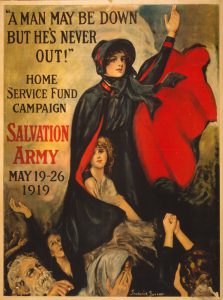
The Salvation Army crowd-gathering techniques were as effective as their innovative social services for the down-and-outers. “In the early days their brass instruments, jingling tambourines, and resonant bass drums clamored over the din of horse-drawn carriages and noisy peddlers,” reports Winston. “Their testimonies, shouted from street corners, captured the curious, while their renditions of popular tunes – ‘Swanee River’ or ‘Tramp, Tramp, Tramp’ rewritten as hymns – roused critics to decry such blasphemous strategems.”
The trailblazing methods – loud music, dancing, posters resembling P. T. Barnum’s advertisements – were not welcomed by respectable religious observers, nor by those outside the fold who were annoyed by their message about a transformed life. The Salvationists were attacked in print and sometimes physically assaulted for their public preaching and worship services. One writer actually had the ugly audacity to group African Americans with “whores” and “bums.” “A more motley, vice-smitten, pestilence-breeding, congregation could seldom be found in a house of worship,” wrote the jaundiced reporter from the New York Herald. “There were Negroes, dancing girls, prostitutes, and station house tramps sandwiched between well-dressed visitors who had sauntered in out of curiosity. The floors were as clean as a deck of a man-of-war, but in a few minutes they were frescoed with tobacco juice, the stench became overpowering, and a yellow-fever pest-house could not have been less attractive.”
Throughout its colorful history, the public mockery and vicious assaults were never able to dim the bright light projected from The Salvation Army. “Whether parading in the streets, singing in the saloons, or appearing on the city’s stages, the Army used the venues and forms of the contemporary culture to promote an alternate, even subversive message,” writes Winston. Booth never wanted to surrender one square inch of life or culture to his spiritual enemy. “Why should the devil have all the dancing?” he asked. “You must sing good tunes … I don’t care much whether you call it secular or sacred. I rather enjoy robbing the devil of his choicest tunes, and, after his subjects themselves, music is about the best commodity he possesses,” he concluded. “It is like taking the enemy’s guns and turning them against him.”
It’s a provocative countercultural message – similar to the Red Kettle in front of a department store at Christmas time. Yes, enjoy Christmas, Booth might say, but please don’t forget the less fortunate. The kettle was first utilized in San Francisco in 1891 when Joseph McFee wanted to raise funds for a free Christmas dinner for the poor. He borrowed a large crab pot and hung it from a tripod on a busy street. With a sign that read, “Fill the Pot for the Poor – Free Dinner on Christmas Day,” he was able to collect enough spare change to feed more than 1,000 hungry men, women, and children.
That’s the creative spirit and spiritual legacy of The Salvation Army. It has earned our support.
Steve Beard is the editor of Good News.

by Steve | Nov 28, 2017 | Magazine, Magazine Articles, Nov-Dec 2017

Rev. Rob Renfroe
By Rob Renfroe-
We all need the same things: air to breathe, food to eat, a place to sleep, a sense of security, a feeling of self-worth. When it comes to needs, we’re all the same. It’s your wants that make you different. It’s your wants that determine who you are and the choices you make. It’s your wants that create the life you live.
What do I want? I want to glorify my Lord and Savior and bless the world he died to save. And there is no greater way of doing that than letting him use me to make passionate and purposeful disciples of Jesus Christ. That is my calling, but more than that, it’s the calling of the church. Our calling is to make disciples of Jesus Christ who will bring salvation to the nations and social holiness to the world. How does the church make disciples? Let me suggest three ways.
1. Truth. We preach the truth. We teach the truth. We live the truth. We do all we can to get our people into the Word and to get the Word into them. Why? “If you continue in my word,” Jesus said in John 8, “you will know the truth and the truth will set you free.”
I was heartbroken to read a prayer that one of our bishops asked his churches to pray for our denomination as we struggle with questions of unity and sexuality. Here’s how it begins: “God help us! Help us … to take the next faithful step forward not based on … doctrine, tradition, or theology.” He goes on: “God help us! Help us … to take the next small faithful step forward that is neither … right or wrong; good or bad; for or against.”
In other words, Help us to be faithful – but faithfulness that is not based on theology or doctrine, faithfulness that is not based on right or wrong, good or bad. Can you imagine the apostle Paul writing to Timothy, “Watch over the church in your care, help them to be faithful, but tell them not to worry about theology or doctrine.”
Can you envision Jesus giving his apostles the Great Commission, “Therefore, go into all the world and make disciples, teaching them … ah, forget that teaching part. All that stuff I told you these past three years isn’t all that important. Just tell them God is nice and they should be, too.”
What is theology? What is doctrine? It’s what we believe about God and how we are to live in light of who God is. The bishop suggests that we act simply out of love. And who can be against that? But how do we know what love is? Do we let our hearts tell us what it means to love? The hearts within us that are fallen and self-serving? Do we let our hedonistic, materialistic culture define love? Of course not. Instead, we go to God’s word which tells us; “By this we know what love is: Jesus Christ laid down his life for us.” Without theology, we wouldn’t know what love is.
What is our hope? That the word of God is living and active, cutting deep within our souls. That the word of God will confront us with our sin in a way that we must be honest with ourselves and with God. As a pastor for 35 years, I have learned that real spiritual and emotional growth is impossible unless we are willing to be honest with God and ourselves about ourselves.
The problem is, as T.S. Eliot wrote, that “humankind cannot bear very much reality.” We don’t want to see the wrong things we do, much less the wrong things we are. We don’t want to be naked before God or others or even ourselves. Like Adam and Eve in the garden, we cover up, hide, and pretend. And when we do, we live lives that are false, stop growing spiritually, and fail to become disciples of Jesus who are growing into the likeness of our master.
That’s why Jesus came with grace and truth. Because we need both. That’s why the first words on his lips in Mark’s Gospel are, “The time is fulfilled; the kingdom of God is at hand; repent and believe the Gospel.” In other words, look at the truth of who you are. And where you’re wrong, get right with God. That’s why Jesus told the woman caught in adultery, “Go and sin no more.” People need the truth about God and the truth about themselves. Change begins when we get into that truth and we get that truth into us. We need to make certain our people know that we do not change the Word of God; it changes us.
2. Time. If we are to make disciples, we must encourage and make opportunities for our people to spend time with Jesus. “Remain in me, and I will remain in you,” said Jesus. “No branch can bear fruit by itself; it must remain in the vine. Neither can you bear fruit unless you remain in me. … Apart from me you can do nothing” (John 15:15).
The first duty and the greatest privilege of a disciple is to spend time with Jesus. Take special notice of this verse: “Jesus appointed twelve as apostles that they might be with him and that he might send them out to preach and to have authority to drive out demons” (Mark 3:14).
These are the big boys. These are the apostles. They are going to take the Gospel to the ends of the earth, heal the sick, raise the dead, and cast out demons. But the first privilege they are given is “that they might be with him.” That’s first. That’s where the power comes from. That’s where lives are changed.
Whenever a kid gets in trouble, the first thing his momma will say is: “He fell in with the wrong crowd. They rubbed off on him.” And if you’ve had trouble with your children, one of the things you pray for over and over is that God will bring someone into his or her life that will be a good influence. Why? Because we know that our relationships change us. We become like those we spend time with.
Just being with someone has an effect on us. Remember when Moses spent time with God on Mt. Sinai and he came down to meet with the Israelites and they were afraid of him. Why? Because his face was glowing. He spent time in the presence of God and he began to reflect the nature and the character of the God he had been with. This won’t sound very theological, but the simple point is that the more time Moses spent with God, the more God rubbed off on him and the more Moses was changed into the image of God.
If we want to make disciples of Jesus, we must teach them to spend time with him. Worship, prayer, reading his word, holy communion, fasting, and meditation – the means of grace, the spiritual disciplines. The Christian life is not something we live for Jesus, it’s the life Jesus lives through us.
3. Terror. By terror I mean we must get our people into situations where they are in over their heads. Where they come to the end of themselves so they have to depend upon God in ways that are new and frightening.
You and I need to be uncomfortable. We need to get into situations that raise questions that don’t allow for easy answers or a shallow spirituality. We need to have experiences where we don’t know what to do and we don’t know what to think.
We need to get out of a world that is isolated and safe and churchy and into a world that is so needy and so full of pain that we feel what we’ve never felt, ask what we’ve never asked, weep like we’ve never wept, pray like we’ve never prayed, and experienced God like we’ve never experienced him before.
We can read about poverty and we can read about a God who loves the poor, but until we have been among the poor, we won’t understand poverty and we won’t really understand God’s heart for the least and the last.
We can read about a Savior who healed the broken and loved the despised, but until we have listened to their stories and cared for them ourselves, we won’t truly understand Jesus or the power of what his love can do in a life.
The same experiences that keep us in our comfortable, predictable worlds where our ideas are safe and unchallenged, where our skills and our knowledge are sufficient, will never produce a life that is adventurous or a heart that is wise.
They only create lives that are complacent and hearts that are small. How do we make disciples? We encourage and make opportunities for our people to care for the sick, the poor, the broken, and the lost. Not just so they will become disciples of Jesus, but so we will.
What do you want? I want my life to count. Eternity is in my heart. God put it there. I want my life to count for eternity. And the best way I know to do that is to make passionate, purposeful disciples of Jesus Christ. If your heart is as my heart, then give me your hand. And let’s change the world together for the glory of our Lord and Savior Jesus Christ.

by Steve | Nov 28, 2017 | Magazine, Magazine Articles, Nov-Dec 2017
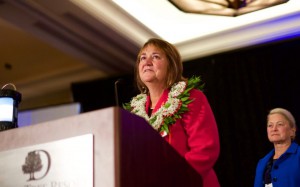
After the consecration of the Rev. Dr. Karen Oliveto as bishop by the Western Jurisdiction. UMNS photo.
According to a United Methodist News Service article published on August 23, 2016 – more than one year ago – Bishop Grant Hagiya, president of the Western Jurisdiction’s College of Bishops, said then newly-elected Bishop Karen Oliveto, an open lesbian married to a UM Church deaconess, “faces multiple complaints under church law.”
One full year went by and there never was a peep about the complaints or the status of the process. Good News reached out to Bishop Hagiya and asked him about the complaints and if there was an explanation for the unusually long delay regarding resolution.
Hagiya responded as follows: “Due to Judicial Council Ruling 1341 [April 2017], and under advisement of our legal counsel, we dismissed the original complaint without prejudice, and opened up a new complaint submitted in light of 1341 to deal with any issues pertinent to the new ruling.
“A new complaint supervising committee has been formed and will begin working on this new complaint.”
With all due respect, concerned lay persons and clergy view this as an ecclesiastical three-card monte sleight of hand. Yes, we are aware there is a portion of United Methodism that is downright giddy about Oliveto’s election. And we are well aware that the new caucus group “Uniting Methodists” is at least publicly indifferent – neither heartbroken nor celebratory – about Oliveto’s election, consecration, and episcopal leadership. However, there are the vast majority of United Methodists who believe that this process lacks credibility and transparency. For them, it is about the integrity of the process and the heart of accountability within United Methodism.
According to church law, the status of complaints against a bishop must be reported after 120 days. However, if the parties involved in the matter have not reached a resolution they can request an additional 120 days, and, if necessary, another 120 after that. Apparently, Oliveto’s colleagues in the West are attempting to indefinitely postpone any decision for their colleague. They think the church’s sexual ethics, teachings on marriage, and its ordination standards are wrong. While they are certainly entitled to their opinions, their actions – or lack thereof – are raising serious questions about the possibility for church unity and trust.
What comes of a church when some of its bishops cavalierly decide which laws they will and will not enforce? What comes of church unity when some of its leaders are patronizingly dismissive of values held by the vast majority of United Methodists across a global denomination? And what comes of trust when bishops give the appearance they are protecting one of their own when it comes to legitimate complaints?
Lest we forget, several bishops issued statements lamenting Oliveto’s election as a breach of the church’s covenant and its unity. The Council of Bishops’ Executive Committee, citing “the great importance of the matter,” encouraged the Judicial Council to take up the matter as soon as possible. United Methodists rightly expect a just and timely resolution of this case. At this juncture, the Western Jurisdiction bishops’ failure to push for timely action would be indicative of their arrogance and disdain for the wider church.
–Good New Media Service.
![When God Grieves]()
by Steve | Nov 28, 2017 | Magazine, Magazine Articles, Nov-Dec 2017
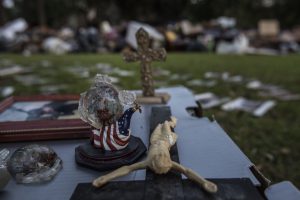
Items lay out to dry from flood damage from Hurricane Harvey. Photo by Kathleen Barry, UMNS.
By Elizabeth Glass Turner-
“Creation itself will be set free from its bondage to decay and will obtain the freedom of the glory of the children of God. We know that the whole creation has been groaning in labor pains until now; and not only the creation, but we ourselves, who have the first fruits of the Spirit, groan inwardly while we wait for adoption, the redemption of our bodies. For in hope we were saved. Now hope that is seen is not hope. For who hopes for what is seen? But if we hope for what we do not see, we wait for it with patience.
“Likewise the Spirit helps us in our weakness; for we do not know how to pray as we ought, but that very Spirit intercedes with sighs too deep for words” – St. Paul (Romans 8:21-26).
This tilted rock that we call planet earth has been groaning. You can almost hear the geological grinding of planetary distress; above, in an expensive international tin can, astronauts peered down below at tight eyes of sprawling white storms, islands usually illuminated gone black. While the International Space Station hurtles through orbit with multiple sunrises and sunsets a day, it is emblematic of humanity’s hopes for the best in us: exploration, cooperation, respect, discovery. But astronauts get the news too, and I wonder what continent they were speeding over when word came that an American took bags of weapons into a hotel so that he could harm as many concertgoers as possible before ending his own life.

Water and food were the most pressing needs in the Jayuya area of Puerto Rico. Photo by Gustavo Vasquez, UMNS.
Houston floods, a city soaked, humid, and moldy. Mexico City shakes as tectonic plates grind, turning buildings to rubble. Multiple Caribbean islands brace against wind, power outages, blocked roads. Puerto Rico goes dark, patients stranded in upper-level cardiac units of hospitals where temperatures swell over 105 degrees. Las Vegas crumples, stunned, as the tourist destination known for pleasure, excess, and entertainment weeps while dawn breaks over broken bodies and overwhelmed hospital staff members. The British Isles brace when Ophelia sweeps in from the ocean, knocking trees down on cars with people in them, brushing electricity off for hundreds of thousands of residents. California burns with ferocity, blackened beams angled crookedly where homes once stood. The Rohingya people continue to stream away from genocide in Myanmar with tales of atrocities. Kurdish cities evacuate as Kurdistan and the Iraqi government go toe-to-toe over oil-rich territory now vacated by ISIS. A young man walks into a New Mexico library and shoots employees. Los Angeles comes face to face with its own ugly corruption, power and wealth buckling under the weight of one too many women saying, “me too.”
When Florida prepared for potential catastrophe from Hurricane Irma, I wrote this note to friends on social media:
Dear Floridans:
You are loved, and you’re being prayed for. You’re not alone. But I can’t promise everything will be okay. I’ve seen a lot of kind, inspirational Bible verses suggesting that God has promised that you’ll be safe. The thing is, you might not be. Tragedy happens in this world, like the joyful saint I knew growing up who was killed in a car accident leaving church after volunteering.
Being someone who believes in God doesn’t give you supernatural AAA. It’s not insurance. The Apostle Paul was shipwrecked. Simon Peter was crucified. They had the same Old Testament you do, with scriptures about God’s protection.
Here’s what I can tell you.
1) Loss, death, and grief don’t disprove faith in God. They are equal-opportunity realities that descend on every human. We live in a finite, hurting world. It hurts, and we scream and rage, and that is ok. There’s a whole book in the Old Testament called Lamentations.
2) We pray. I don’t understand why sometimes doctors shake their head and mutter, “I hate this word but it’s a miracle,” and why sometimes, miracles seem to be withheld. Because of this we must be very careful when we claim, “God protected me” while our neighbor’s house was flattened. We pray for protection for ourselves and others; but we also pray for peace, for grace, for other people in the world suffering at the same time. We give thanks for infrastructure and FEMA and aid organizations. We pray for relief workers and hospital staff working long hours. We pray for kids who are scared. We pray for animals.
3) There’s a Bible verse that is descriptive: “The rain falls on the just and on the unjust.” Whether rain is a good thing, for farmers with dry crops, or a bad thing, like floodwaters in Houston, we live in a natural world. Nature is real. Whether you’re a kind person or a jerk, we both experience forces of nature. It might not seem fair – you’ve been law-abiding and your house and belongings are ruined, and your wife-abusing neighbor’s house was spared. If you believe in an all-powerful God, it’s not inconsistent to say both that God controls the universe and that air currents, the slight dip in your street, and the choices of the contractors who built your house are all real factors.
4) Take stock of what really matters. Where in your life have you been coasting? What have you been putting off? Let these experiences drain your fear rather than magnify it.
We are tired of hashtags. #HoustonStrong. #MexicoCityStrong. #PuertoRicoStrong. #VegasStrong. #CaliforniaStrong. Whose city is next? Whose church? In the face of natural evil – catastrophic weather events, earthquakes, wildfires – we also witness human evil: the desire to make other human beings suffer for his own twisted purposes, punishing all who witness it by making certain he died before anyone could ask him why he was doing this. What extraordinary spite.
If hurricanes, earthquakes, and wildfires remind us how relatively powerless we are on this tilted, groaning rock, a man firing out of a hotel window, or brutal soldiers killing children in an ethnic scourge, remind us how evil we are capable of being. We have met the enemy, and he is us.
When we are weary of multiple tragedies unfolding so quickly we cognitively cannot keep up with it, what happens to our hearts? Every time a new tragedy hits the news crawler, does your blood pressure spike? Are you numb? Have you become deaf to groans as a coping mechanism? Do you fatalistically believe it’s God’s mysterious will that children in Myanmar and Mexico City die? Do you turn off the news and read an idyllic book that paints a different picture of reality? Do you leap to activism, collecting water, donating money, lobbying for bump stocks to be banned, shoveling out moldy linoleum from a neighbor’s ruined home?
Every time something bad happens, variations of the same meme appear on social media: a quote from Mr. Rogers, whose mother told him that when something bad happened, to look for the helpers – in other words, to see the goodness of humanity, the kindness and love pouring out for each other. To a degree, it’s a beautiful response. Yet even beautiful responses can lose their power when the same quote is posted a dozen times in a month. We get compassion fatigue; we get news fatigue; we get imagination fatigue. In part, this jaded weariness comes from a very childlike place: “but we had hoped…”
Does that phrase sound familiar? It’s one of the saddest phrases in scripture, coming from a downcast disciple walking with a friend and a stranger on the way to Emmaus.
He said to them, “What are you discussing with each other while you walk along?” They stood still, looking sad. Then one of them, whose name was Cleopas, answered him, “Are you the only stranger in Jerusalem who does not know the things that have taken place there in these days?” He asked them, “What things?” They replied, “The things about Jesus of Nazareth, who was a prophet mighty in deed and word before God and all the people, and how our chief priests and leaders handed him over to be condemned to death and crucified him. But we had hoped that he was the one to redeem Israel” (Luke 24:17-24).
It may have been silly of us, but we had hoped. We were proven wrong, but we had hoped. We knew better, but we had hoped anyway.
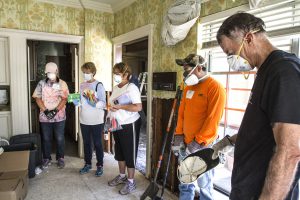
Volunteers from Chapelwood United Methodist Church in Houston “embody grace” by volunteering in homes flooded by Hurricane Harvey. Here they pause for prayer. (From left) Helen Crowe, Mary Fuller, Suzanne Musgrove, Daniel Solis and Dennis Crowe. Photo by Kathleen Barry, UMNS.
This unknown stranger asked them questions and let them talk: what is on your mind, and what is your interpretation of the things on your mind? And their grief, disillusionment, and fatigue all come pouring out.
We had hoped faith communities would have the last word, but some of the women saying, “me, too,” were assaulted in churches. We had hoped a political party would help straighten out wrongs, but some evil goes beyond party platform. We had hoped for a safer region to live in after ISIS left, but now old disputes are reemerging about who lays claim to what land. We had hoped for peace in Myanmar, but satellite imagery shows swaths of burned land. We had hoped our cities and bridges and highways were reliable, dependable, and sufficient, but they’re a toy train set ready to be knocked over compared to the phenomenal power of a superstorm. We had hoped for a return of routine, but the power is still out. We had hoped for a nice night of escape at a concert until the gunfire rang out.
When one of Jesus’ best friends, Lazarus, died, before Jesus sobbed at the pain of death and grief that afflicts all humanity, he had to talk to Lazarus’ sisters. Mary wouldn’t come out of the house to see him. Martha did, and was the first to throw out words that stung like vinegar: “Lord, if you had been here, my brother would not have died.”
If you had been here, God, it would have been alright. We had hoped you would come in time. But you show up now?
“Jesus said to her, ‘Your brother will rise again.’ Martha said to him, ‘I know that he will rise again in the resurrection on the last day.’”
If anyone else had said it, it would have been a condescending platitude: you’ll see your brother again. And Martha, with orthodox faith for the future but little hope for the present, responds, knowing it will be alright someday. Not now, but someday. She cannot picture a present where things are made better.
Martha went back to the house and quietly told her sister that Jesus was asking for her. Mary emerged quickly from the house, her friends sitting in grief with her following her, and as Mary approaches Jesus, none of the right Sunday school answers come out. Instead, the words hit him in the face again: “If you had been here, my brother would not have died.”
And when Jesus saw Mary sobbing – Mary, who had neglected kitchen duty with her sister to sit at Jesus’ feet with men and learn – when Jesus saw Mary and her friends sobbing with no right answers, only questions, Jesus was “greatly disturbed in spirit, and deeply moved.” And as he asked where Lazarus was buried, he began to sob.
There are times when arguments about the sovereignty of God won’t cut it. Hope without compassion is a sterile, self-centered escape plan. But compassion without hope is just as fatalistic, drying into weary despair.
Jesus didn’t scold Mary. Jesus looked at her. And when the Word Made Flesh looked at Mary, the tears came and wouldn’t stop. He was disturbed from the inside out, irreversibly moved. There was a shuddering earthquake in the heart of the Trinity. The Word Became Flesh, and sobbed. Not much later, the body of Christ would be broken for Mary, for Lazarus, for Martha, for families in Mexico, for kids in Myanmar, for women shakily calling 911 after assaults, for country music fans helping each other escape over fences, for mass shooters, for me, for you. But when Jesus looked at Mary, the heart of Christ was broken.
Later, Paul would write to early Christians in Italy that the “Spirit intercedes with groans too deep for words.”
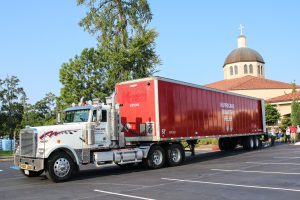
The Woodlands (Texas) United Methodist Church operated as a distribution center after Hurricane Harvey. Photo by Steve Beard.
What are you talking about as you walk along? What’s the news? What events are you talking about? These questions from a shared walk along the road echo across the centuries. Is your hope past tense? “We had hoped…” Is your hope only in a distant future? “I know that he will rise again in the resurrection on the last day.”
This tilted rock that we call planet earth has been groaning. You can almost hear the geological grinding of planetary distress. But the heart of the Trinity has been groaning. You can almost hear Jesus’ sobs at humanity’s pain and distress.
Paul asks us to quiet our hearts and listen in hope for the sounds of the Spirit interceding for us with groans too deep for words. It is the sound of the God who grieves. Christ has died; Christ is risen; Christ will come again. These words give order to our own grief. We don’t have a high priest who is unable to sympathize with us: Jesus Christ died. When Christ died, death itself got a final notice. And when Christ comes again, that last enemy, death, will be destroyed.
Meanwhile, we do not weep alone.
Elizabeth Glass Turner, a frequent contributor to Good News, is Associate Director of Community & Creative Development at World Methodist Evangelism.

by Steve | Nov 28, 2017 | Magazine, Magazine Articles, Nov-Dec 2017

Art by Scott Erickson.
scottericksonart.com
Introduction by Jerry L. Walls-
The idea for doing this Protestant Confession first occurred to me while doing research for the book I co-authored with Ken Collins on Roman Catholicism (Roman But Not Catholic: What Remains at Stake 500 Years After the Reformation). One of the big themes of our book is the true nature of catholicism, and the contention that Protestantism, rightly understood, embodies catholic faith at its best. While doing this research I was struck by the fact that a number of Protestant theologians were calling for a recovery and renewal of catholicity. They used different phrases, like “Reformed catholicity,” and “mere Protestant orthodoxy” and others as well. But the essential idea was that Protestants need to recover a deeper awareness of their catholic heritage to be true to the legacy of the Reformers, who very much aimed to preserve and promote apostolic, catholic Christianity.
This notion intrigued me because my research had shown how often Roman Catholic apologists fasten on to the differences among Protestants and paint the Reformation as a movement that led to endless division and factions. The more I thought about this, the more I wondered whether the idea of Reformation catholicism really existed, and if so, what it would look like. Is there in fact substantial catholic unity among the diverse heirs of the Reformation, and if so, shouldn’t we be able to show what this looks like in a concrete way? Or is the notion of Protestant catholicism a mere intellectual abstraction, or worse, an outright contradiction?
As the questions were pondered, the more I realized the 500th anniversary of the Reformation was the perfect time to be doing so. Indeed, I became convinced that one of the best ways we could commemorate the Reformation was to demonstrate substantial Protestant unity in a way that would honor the Reformers’ catholic convictions and intentions.
In January, I wrote to the authors of some of the books who had been calling for a recovery of catholicism to propose the idea of producing a statement that would demonstrate substantial catholic unity among Protestants. I also included a handful of other friends I thought might be sympathetic. I was particularly curious to see if they would be willing to put these ideas into practice, or if they would take the easy way out of declining to specify what Reformation catholicism actually looks like.
I was pleased that the persons to whom I sent my email found the idea interesting and asked for further details of what I had in mind. So I sent a follow up email giving more details and sent it to a few more persons in addition to the original list. One of the persons on that original list was Kevin Vanhoozer of Trinity Evangelical Divinity School (whose book Biblical Authority After Babel: Retrieving the Solas in the Spirit of Mere Protestant Christianity had been one of the books that inspired my idea), and he seemed particularly intrigued by the idea of producing such a Confession. We exchanged several more emails, and he mentioned that if we attempted such a document, that it might be a good idea to have a single author write the initial draft for the sake of consistency of style. I called him up and told him I knew the perfect person to write the initial draft, a man with the necessary theological expertise, experience, and academic stature, namely, Kevin J Vanhoozer. Prior to this conversation, we had never talked before, and knew each other only by reputation. Kevin naturally had a lot of questions, and was hesitant, but the more we talked, the more excited we both got about the possible good such a Confession might do if we could pull it off. Before we ended our conversation, Kevin had agreed to write the initial draft.
Together, we drew up a list of notable systematic and historical theologians from various Protestant traditions who we hoped would be responsible to critique the initial draft and work together to revise and rework the Confession in language we all found agreeable. We were delighted with the very positive responses we got to our invitation and the enthusiasm for what we had proposed to do. By the middle of February, our Committee was essentially complete and the process of producing the Confession was underway.
We were also very much encouraged by the enthusiastic support of David Dockery, President of Trinity International University, who has been on board with us from the beginning. We were delighted when Timothy Tennent, President of Asbury Seminary, and Timothy George, Dean of Beeson Divinity School (who we affectionately call 1 and 2 Timothy) agreed to serve as co-chairs of the Steering Committee. After this, everything came together to give us a chance to achieve what we had hoped when we first conceived the idea for our Reforming Catholic Confession.
Working on the Drafting Committee of the Confession was one of the great ecumenical experiences of my life. Kevin’s original document was subjected to extensive criticism and went through two rounds of revision at the hands of the committee. We corresponded by email, and the critical comments and constructive suggestions totaled some sixty single spaced pages between the two rounds of revisions. The spirit of mutual respect and cooperation was remarkable throughout, especially when we dealt with difficult issues that had divided the Reformers, and remained points of contention between our various traditions, such as the sacrament of the Lord’s Supper. It was very gratifying to see Pentecostals and Lutherans, for instance, working together collegially to find language we could all agree upon. And Kevin as the lead author modelled throughout what a world class Reforming Catholic theologian looks like as he graciously and expertly incorporated the many suggestions coming his way.
Of course, the final document does not fully express the views of any of the traditions represented. Still, it was very encouraging that we could find substantial common ground even on contested issues historically fraught with controversy. The issue for our document is not, “does this say everything you would prefer?” but rather, “can you agree with us thus far?” And again, the ground of common agreement is both robust and rich. The Confession makes no pretense of eliminating all our differences, nor does it aim to replace the official doctrinal confessions of our various churches. But it does show that the diverse heirs of the Reformation who follow the principle of sola scriptura (scripture alone is our final authority for doctrine) are deeply united on core Christian doctrine. And that is cause for celebration as we mark the 500th anniversary of those epoch-making series of events that we call the Reformation.
To read the full document, click here.
Jerry L. Walls is a Scholar in Residence and Professor of Philosophy at Houston Baptist University. He is the author of Hell: The Logic of Damnation; Heaven: The Logic of Eternal Joy; Purgatory: The Logic of Total Transformation. Additionally, Dr. Walls was the author of The Problem of Pluralism: Recovering United Methodist Identity.
Art by Scott Erickson (scottericksonart.com).
![When God Grieves]()
by Steve | Nov 28, 2017 | Magazine, Magazine Articles, Nov-Dec 2017
 By Stephen Seamands-
By Stephen Seamands-
In the Wesleyan tradition, we often celebrate John Wesley’s experience at Aldersgate on May 24, 1738, when he “felt his heart strangely warmed.” And no doubt, had there been no Aldersgate, where Wesley himself came to a profound assurance of his own personal salvation, there surely would have been no Methodist movement. As he recorded in his Journal, “I felt I did trust in Christ, Christ alone for salvation; and an assurance was given me that He had taken away my sins, even mine, and saved me from the law of sin and death.”
But six months later another crucial event occurred in John Wesley’s life. Though often overlooked, it too was indispensable in launching the movement. I like to think of it as the original Methodist Pentecost.
It happened in the wee hours of the morning on New Year’s Day, 1739. Wesley, his brother, Charles, his friend, George Whitfield, and about sixty others, who were members of a group known as the Fetter Lane Society, were gathered together for a New Year’s Eve watch night service. Here’s how Wesley describes what happened:
“About three o’clock in the morning, as we were continuing instant in prayer, the power of God came mightily upon us, insomuch that many cried out for exceeding joy, and many fell to the ground. As soon as we were recovered a little from that awe and amazement at the presence of His Majesty, we broke out with one voice, We praise Thee, O God; we acknowledge Thee to be the Lord.”
This outpouring of the Holy Spirit where, as Wesley says, “the power of God came mightily upon us,” catapulted Wesley outward. It caused him and those gathered there to become other-directed as never before. Up until then Wesley had primarily been absorbed in his own quest for personal salvation. Aldersgate gave him the deep certainty he needed about that. However, as a result of the outpouring of the Holy Spirit at Fetter Lane, his focus shifted. Wesley was thrust out beyond himself so that the salvation of others, particularly those outside the church, became his burning passion.
This shift became evident to all four months later in what Dr. Albert Outler, Methodism’s preeminent Wesley scholar, called Wesley’s “embarrassing descent into field preaching.” Following the New Year’s Day outpouring, his friend, George Whitfield, had begun preaching outdoors in late February. He was amazed at the positive response of the unchurched common people, and the profound way God worked through this unconventional approach to preaching and evangelism. So he told Wesley what he was doing and urged him to follow suit. He even invited Wesley to watch him do it.
But everything in John Wesley — his church background, his academic and ministerial training, his personality type — cried No. He was an ordained Anglican priest and an instructor at Oxford who firmly believed all things should be done “decently and in order.” Preaching was therefore only meant to happen inside a church and from behind a pulpit. Some in the Church of England even maintained that preaching outdoors, or field preaching as it was called, was a violation of civil and canon law.
Wesley himself was certainly not well suited for it. As to personal preference, he was finicky about his personal appearance. He always dressed as neat as a pin and wouldn’t tolerate dirt on his clothing. An introvert at heart, he preferred the quiet of a library to the ruckus of an unruly crowd.
In his Journal entry for March 31, 1739, Wesley expressed his reservations: “In the evening I reached Bristol and met Mr. Whitefield there. I could scarcely reconcile myself at first to this strange way of preaching in the fields, of which he set me an example on Sunday; I had been all my life (till very lately) so tenacious of every point relating to decency and order that I should have thought the saving of souls almost a sin if it had not been done in a church.”
However, in spite of all his reservations, he could no longer hold back. As a result of the outpouring of the Spirit at Fetter Lane, Wesley had been thrust beyond himself. A few days later, on April 2, 1739, he crossed the Rubicon. As he records in his Journal:
“At four in the afternoon I submitted to be more vile and proclaimed in the highways the glad tidings of salvation speaking from a little eminence in the round adjoining to the city to about three thousand people. The scripture on which I spoke was this, … ‘The Spirit of the Lord is upon me, because he hath anointed me to preach the gospel to the poor.’”
When Wesley says he “submitted to be more vile” he really meant it! And from what he said years later we know that he never really liked field preaching. But when the Spirit of the Lord comes upon you like it came upon Wesley and the others that night at Fetter Lane, how can you hold back? How can you not become a witness for Christ and boldly proclaim the glad tidings of salvation?
And what an amazing, Spirit-empowered witness John Wesley became! For the next fifty years he preached all over England in the open air. He travelled some 225,000 miles on horseback, preached 40,000 sermons, won as many as 144,000 converts to Christ and established a vast network of Methodist societies within the Anglican Church.
Wesley was severely criticized, even by family members, for field preaching. Anglican church leaders reprimanded him because he would not respect the established boundaries of parishes. But to no avail. In a famous letter to James Harvey, he explained why he found it necessary to invade the parishes of other clergy:
“Man forbids me to do this in another’s parish: that is, in effect, to do it at all; seeing I have now no parish of my own, nor probably ever shall. Whom, then, shall I hear, God or man? …
“Suffer me now to tell you my principles in this matter. I look upon all the world as my parish; thus far I mean, that in whatever part of it I am I judge it meet, right and my bounden duty to declare, unto all who are willing to hear, the glad tidings of salvation.”
When the Spirit is poured out on us, as it was upon John Wesley, then the whole world will become our parish too. It will be our “bounden duty to declare … the glad tidings of salvation.” As Jesus said, “you will be my witnesses in Jerusalem, in all Judea [our immediate surroundings], and Samaria [across cultures], and to the ends of the earth” (Acts 1:8).
Jesus stressed that this would happen “when the Holy Spirit comes upon you.” So just before he ascended, he promised his disciples he would be “sending upon [them] what [his] Father promised” (Luke 24:49). And in his final instructions he told them to “stay here in the city [Jerusalem] until you have been clothed with power from on high” (Luke 24: 49).
The disciples took his instructions to heart. Their recent failures in abandoning and denying Jesus had made them painfully aware of their impotence to carry out his mission. So this time they did exactly what he said. After Jesus ascended, they went back to the upstairs room in Jerusalem where they were staying and for the next ten days, along with “certain women, including Mary the mother of Jesus, as well as [Jesus’] brothers” they “constantly [devoted] themselves to prayer” (Acts 1:14). Then on the Day of Pentecost, the ascended Christ fulfilled his promise. The Holy Spirit was poured out upon them (Acts 2:1-4).
The ascended Christ wants to send the Holy Spirit on us today so that we too can join him in accomplishing his mission. But for that to happen we must first do what Jesus told his disciples to do. We must wait and devote ourselves to prayer until we are endued with power from on high.
The great Methodist missionary E. Stanley Jones often said that “Unless the Holy Spirit fills, the human spirit fails.” Like the disciples, then, we need to tarry and wait. We need to ask the ascended Christ to send the Holy Spirit upon us to clothe us with power so we can be his witnesses and join him in his mission. We need to devote ourselves to prayer and find others who will pray with us.
As we pray, we should ask Jesus to increase three things in us.
First, ask him to increase our desire for more of himself and more of the fullness of the Holy Spirit. “Before we can be filled with the Spirit,” says A.W. Tozer, “The desire to be filled must be all consuming…The degree of fullness in any life accords perfectly with the intensity of true desire. We have as much of God as we actually want” (The Divine Conquest). In speaking about the Spirit, Jesus himself said “Let anyone who is thirsty come to me” (John 7:37). So let’s ask the Lord Jesus to make us thirsty by increasing our desire for more of the Holy Spirit.
Second, ask Jesus to increase our will to surrender and give up control. Richard John Neuhaus is right: “It is our determination to be independent by being in control that makes us unavailable to God” (Death on a Friday Afternoon). In order to experience more of the Spirit’s presence in our lives, we need to surrender areas where we are insisting on being “independent by being in control.” Where in our lives does self need to be dethroned and Christ enthroned? Are there areas of unhealed hurt and pain where we are holding on to anger, bitterness, and unforgiveness? So let’s ask the risen Christ to empty us of anything that’s preventing the Holy Spirit from being in control. Let’s ask him to increase our will to surrender all to him.
Third, we should ask Jesus to increase our faith in his promise and the heavenly Father’s promise to fill us with the Holy Spirit. Jesus described this promise of the Father when he said, “If you then, who are evil, know how to give good gifts to your children, how much more will the heavenly Father give the Holy Spirit to those who ask him!” (Luke 11:13). In asking him to fill us with his Holy Spirit, we can be confident that the Father wants to give more than we are willing to receive. The Father will give the Holy Spirit to those who ask him. We don’t have to overcome his reluctance to fill us with the Spirit — just take hold of his willingness.
And Christ the Son’s willingness too! He himself told the disciples, “It is to your advantage that I go away … if I go I will send him [the Holy Spirit] to you” (John 16:7). “And see, I am sending upon you what my Father promised” (Luke 24:49).
The heart of the Father longs for us to experience the person, the power, and the presence of the Holy Spirit. And the Son, through his life, death, resurrection, and ascension, has accomplished everything necessary for that to happen. We should ask that our faith and confidence in the Father and Son’s promise to pour out the Spirit on us will increase. 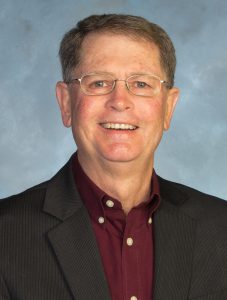
Do we need a personal Pentecost in our own lives? Does our church need to experience another Methodist Pentecost? Then Jesus would say to us, “Wait until you have been endued with the Spirit’s power.” So let us devote ourselves to prayer and join with others in praying that our desire for the Spirit’s fullness would intensify, our surrender to the will of the Spirit would deepen, and our faith in the promise of the Spirit would increase.
Rest assured, if we do, the Holy Spirit will be poured out upon us. And when the Spirit comes, like Wesley we will be thrust out beyond ourselves to join Christ in his mission to the world.
Stephen Seamands is Professor of Christian Doctrine at Asbury Theological Seminary in Wilmore, Kentucky. This article is adapted from a chapter in Dr. Seamands’ recent book, The Unseen Real, published by Seedbed (used by permission).

 By Steve Beard-
By Steve Beard-








 By Stephen Seamands-
By Stephen Seamands-